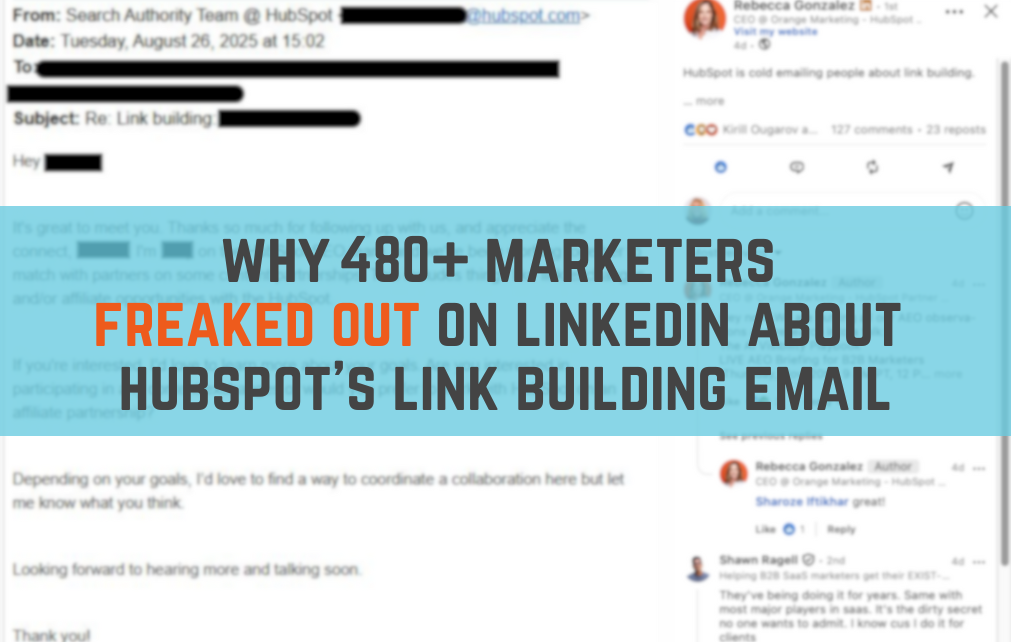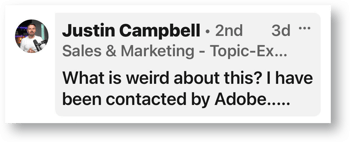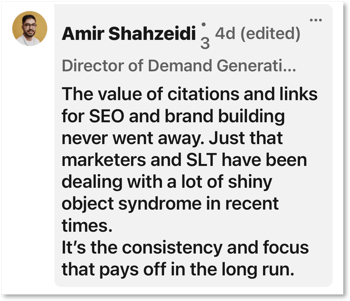3 min read
Why 480 Marketers Freaked Out on LinkedIn About HubSpot's Link Building Email
![]() Rebecca Gonzalez
:
November 10, 2025
Rebecca Gonzalez
:
November 10, 2025

Last week, I posted something I thought was pretty interesting: HubSpot's SEO team cold-emailed one of our clients asking for a link exchange. That's right. HubSpot. The company that ranks for literally everything. Reaching out about backlink partnerships.
What I didn't expect was 494 reactions, 129 comments, 24 reposts, and over 112,000 impressions, and it is still growing.
For context: my B2B posts get maybe 20 reactions on a good day. 2,000 impressions and I am HOT. So why did my post detonate on LinkedIn?
 Why This Hit a Nerve
Why This Hit a Nerve
When a dominant SEO player in B2B visibly changes strategy, it raises existential questions:
If HubSpot needs to hustle for links after years of organic dominance, what does that mean for the rest of us?
Did I waste the last three years chasing shiny objects while ignoring what actually matters?
 The responses revealed that marketers are sitting with these questions, and nobody's quite sure of the answers yet.
The responses revealed that marketers are sitting with these questions, and nobody's quite sure of the answers yet.
What the Responses Revealed
The responses to my post fell into four distinct camps, each telling a story about how marketers are processing the shift happening underneath us.
Camp 1: "If HubSpot's Doing It, Something's Changing"
 These folks connected the dots immediately.
These folks connected the dots immediately.
"If even HubSpot is pivoting, what could this mean for our strategies?"
"Good catch, this says a lot about where organic visibility is heading."
This camp saw it as a signal that authority is being reframed through the lens of trust and citation networks. Not just for Google. For AI.
We've been watching the same thing in our AEO research: when ChatGPT or Perplexity decides what sources to quote, what content to summarize, what brands to surface, they're processing link signals differently than traditional search engines, but they're absolutely processing them.
Links aren't just PageRank juice anymore. They're training data signals that tell AI models what's reputable enough to cite.
Camp 2: "Everyone Does This. Chill."
 The skeptics came in hot.
The skeptics came in hot.
"They've been doing it for years. It's the dirty secret no one talks about."
"Pretty standard operations for just about any successful business these days."

Fair point. Outreach isn't new. Even massive brands like Adobe do it. This response reveals the gap between public SEO discourse and private practice. Everyone says they don't do link exchanges, but everyone quietly does them.
But here's what the skeptics missed: timing matters.
If multiple people are now getting these emails ... if HubSpot is visibly scaling up fundamentals they could have ignored for years ... then something in their data shifted from "nice to have" to "urgent."
When background activity becomes noticeable at scale, that's not business as usual. That's a strategy shift.
Camp 3: "This Feels Legacy"
 The AI-forward crowd dismissed it: "Seems legacy to me."
The AI-forward crowd dismissed it: "Seems legacy to me."
But they're missing the forest for the trees. Link building is morphing into AI authority signaling. In the world of AI search, links tell large language models what's reputable enough to quote or surface as an answer.
The irony? By dismissing link building as "legacy," some marketers are missing that the fundamentals are more important in an AI-driven world, not less.
Camp 4: "Back to Basics (Finally)"
The wisest voices cut through with grounded wisdom:
"The value of citations and links never went away...marketers just got distracted by shiny objects."

There's something poetic about coming full circle. With AI engines rewriting the rules, marketers are realizing that authority and visibility are once again earned, not automated.
What Changed Under the Hood?
So why did HubSpot's SEO team potentially prioritize manual outbound link building?
Here's what we think is happening:
Google is re-weighting trust signals. The helpful content updates, increased emphasis on trust signals, and crackdown on AI-generated content all point toward an algorithm that's pickier about authority.
AI engines treat citations like backlinks. When ChatGPT, Perplexity, or Gemini decides what to surface, they're looking at citation networks and link patterns. If you're not part of those networks, you're invisible in AI search.
The SEO playbook isn't dying. It's evolving. Marketers who recognize that shift early will own the next era of visibility.
The Real Question: "Now What?"
So, should you be doing something specific for AI search? Is AEO real or just another acronym we'll forget next quarter?"
Valid questions. The problem? The information available is a dumpster fire. Half of it's contradictory. The other half is selling you something.
So we did what we always do at Orange Marketing: we researched and identified some priorities, zeroing in on what experts like Neil Patel, Ethan Smith, Josh Grant, and others say actually works right now. And we're unpacking all of it in our upcoming live briefing. Everything cited and linked.
Join Me Live: The AI Visibility Playbook
AEO Briefing for B2B Marketers
LIVE Thursday, November 20, 9 AM PT / 12 PM ET
In our live AEO briefing, we'll walk through the research (with sources), what's actually changing in AI-driven search, where backlinks and citations fit in, and our recommendations for B2B teams heading into 2026.
No fluff. No AI tool pitches. Just clarity, backed by data.
Because if there's one thing, 494 LinkedIn reactions taught me, it's that marketers are hungry for straight answers. 👉 Register HERE.